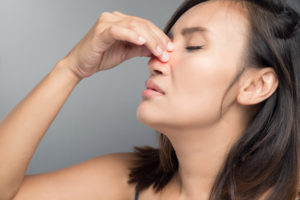A Nasal Polyps Beginner’s Guide: What They Are, the Symptoms, and the Treatments

If you’re tired of not being able to smell the roses – literally – then you may be dealing with nasal polyps. At Allergy, Asthma, and Immunology Medical Group, we believe them to be one of the most misunderstood causes of obstructed breathing and dulling of taste and smell. Physically they are a grayish, grape-shaped growth inside the nose. They are more common than you may think (they affect 30% of Americans) but yet you may still be in the dark.
Read on to learn more about them and how they are treated. If you then believe you have nasal polyps and want treatment from an experienced immunologist and allergist, contact Allergy, Asthma, and Immunology Medical Group at 805-658-9500 to set up an appointment.
Common symptoms of nasal polyps
When nasal polyps are small, they have no symptoms and do not need to be treated, with the possible exception of steroid sprays to prevent them from getting bigger. They become an issue when they grow larger and block the nasal package. At that point they can cause a range of symptoms including loss of smell, difficulty breathing through the nose, excessive mucus, post nasal drip, a runny nose that doesn’t go away, loss of taste, sleep apnea, pressure or pain in the face, and chronic sinus infections.
Diagnosing nasal polyps
The first thing we will do is to give you a full exam. We will likely use an endoscope, which is a thin, flexible tube with a light on the end. This allows us to see inside your nose and the passages of your sinus cavities. In most cases, this will give us a clear picture of whether or not you are dealing with nasal polyps. However, if additional tests are needed, we can provide them as well.
Treating nasal polys
There are numerous treatment options for nasal polyps. Medicine itself rarely gets rid of the polyps but it can be helpful in dealing with the symptoms. Medication options include nasal steroid sprays, allergy medications, and corticosteroid pills to reduce swelling. Antibiotics are not a treatment option for nasal polyps. We will give you a thorough treatment plan with specific options for your unique situation.
How to reduce your chances of getting nasal polyps
You cannot entirely prevent nasal polyps but you can take a few steps to reduce your chances of getting them. The best type is to irrigate your sinuses with a spray or neti pot. If you have allergies or asthma, make sure you keep them under control. Use a humidifier to keep your home cozy and do not smoke or allow a buildup of dust. Wash your hands regularly.
There’s nothing good about getting nasal polyps but they can be treated. If you believe that you may be dealing with them, then we highly encourage you to contact Allergy, Asthma, and Immunology Medical Group at 805-658-9500 to learn we can help you cure and control them.



